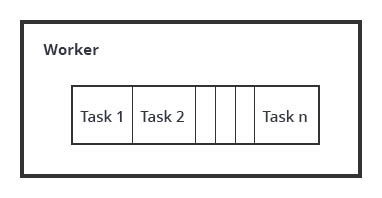https://github.com/soyuka/relieve
Ease the implementation of multi processing accross your microservices
https://github.com/soyuka/relieve
child-process failsafe microservice process task workers
Last synced: 10 months ago
JSON representation
Ease the implementation of multi processing accross your microservices
- Host: GitHub
- URL: https://github.com/soyuka/relieve
- Owner: soyuka
- Created: 2015-11-22T15:35:21.000Z (over 10 years ago)
- Default Branch: master
- Last Pushed: 2022-07-06T22:31:40.000Z (over 3 years ago)
- Last Synced: 2024-10-03T12:16:27.597Z (over 1 year ago)
- Topics: child-process, failsafe, microservice, process, task, workers
- Language: JavaScript
- Homepage: http://soyuka.github.io/relieve/
- Size: 585 KB
- Stars: 48
- Watchers: 5
- Forks: 4
- Open Issues: 7
-
Metadata Files:
- Readme: README.md
Awesome Lists containing this project
- awesome-list-microservice - relieve
README
## Relieve [](https://codeclimate.com/github/soyuka/relieve/coverage) [](https://codeclimate.com/github/soyuka/relieve) [](https://travis-ci.org/soyuka/relieve) [](https://ci.appveyor.com/project/soyuka/relieve)
The goal of this library is to ease the implementation of multi processing accross your existing microservices.
Relieve aims to give a reusable design pattern using process forks. It also eases communication with child processes with an high-level abstraction.
For example, with a CallableTask:
```javascript
//task.js
//just export a module in the child process
module.exports = {
print: (str) => {
console.log(str)
},
data: () => {
//return some async data
return Promise.resolve({foo: 'bar'})
}
}
```
Then from your master, just call the task:
```javascript
//worker.js
var CallableTask = require('relieve/tasks/CallableTask')
var task = new CallableTask('task.js')
task.start()
.then(() => {
task.call('print', 'hello world')
return task.get('data')
})
.then(d => {
//d is {foo: 'bar'}
})
```
### The design pattern
Relieve is based on a design pattern containing:
- A Worker
- One or more tasks

The task can be used without a Worker, but the Worker helps managing workflows.
### Task
The task will implement a child process using `fork`. It'll make sure that there is an ipc channel open so that Workers and Tasks can communicate.
There are different tasks implementations:
- Fork Task - simply transforms a `ChildProcess.fork` in a Task
- Script Task - wraps a script path in a container that is managed through `ChildProcess.fork`. It gives the ability to start, restart or kill a Task
- Callable Task - this is a Script Task with convenience methods to `call` or `get` script methods remotely
#### Tutorials:
- [Fork Task](http://soyuka.github.io/relieve/tutorial-1-ForkTask.html)
- [Script Task](http://soyuka.github.io/relieve/tutorial-2-ScriptTask.html)
- [Callable Task](http://soyuka.github.io/relieve/tutorial-3-CallableTask.html)
### Worker
Different kind of Workers for different use cases. Every Worker takes one or more tasks and handles them.
- Worker - it's a basic worker. Helps sending a message to every task.
- QueueWorker - process tasks one after the other, or in concurrency. Waits for a Task to exit before it consider's it as done.
- CloudWorker - does not wait for tasks to exit and process them through a Strategy (ie: RoundRobin)
#### Tutorials:
- [Worker](http://soyuka.github.io/relieve/tutorial-4-Worker.html)
- [QueueWorker](http://soyuka.github.io/relieve/tutorial-5-QueueWorker.html)
- [CloudWorker](http://soyuka.github.io/relieve/tutorial-6-CloudWorker.html)
### Tools
- [Containers](http://soyuka.github.io/relieve/tutorial-7-Containers.html) - easy way to add ipc methods for your tasks
- [Interfaces](http://soyuka.github.io/relieve/tutorial-8-Interfaces.html) - extends how the tasks are managed (FailSafe, Logger)
### Links
- [Documentation](http://soyuka.github.io/relieve/)
- [Coverage](http://soyuka.github.io/relieve/coverage/lcov-report/)
- [Blog post](https://soyuka.me/having-fun-with-nodejs-child-processes/)